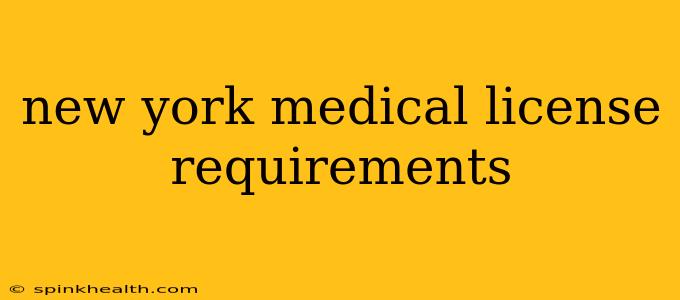The bustling streets of New York City, a global hub for medicine and innovation, hold a magnetic allure for aspiring physicians. But securing a medical license in the Empire State is a rigorous process, demanding dedication, meticulous attention to detail, and a clear understanding of the requirements. This journey isn't just about ticking boxes; it's about proving your commitment to patient care and upholding the high standards of the New York State medical profession. Let's embark on this journey together, unraveling the intricacies of obtaining a New York medical license.
What are the Basic Requirements for a New York Medical License?
The foundation of your application rests upon fulfilling several key criteria. First, you must have graduated from a medical school accredited by the Liaison Committee on Medical Education (LCME) or a comparable body recognized by the New York State Education Department (NYSED). This accreditation ensures your medical education meets the stringent standards required for licensure. Next, you'll need to successfully complete all required clinical rotations and postgraduate training, if applicable. This practical experience is crucial in proving your competence in the medical field. Finally, you'll need to pass both the United States Medical Licensing Examination (USMLE) Steps 1, 2 CK, and 3, or the equivalent competency examinations. These exams are a rigorous assessment of your medical knowledge and skills.
How Long Does It Take to Get a New York Medical License?
This is a question with a variable answer. The processing time for a New York medical license can vary significantly depending on several factors, including the completeness of your application, the time it takes to verify your credentials, and the overall workload of the NYSED. While some applicants may receive their license relatively quickly, it's not uncommon for the entire process to take several months, sometimes even extending to a year or more. Patience and proactive communication with the NYSED are crucial during this phase.
What are the Different Types of Medical Licenses in New York?
New York offers various medical licenses catering to different medical professionals and career stages. The most common is the full medical license, granting the authority to practice medicine independently. However, there are also temporary licenses, such as a temporary permit for new graduates or a license for limited practice, allowing for specific procedures or specializations. Understanding the nuances of these different license types is crucial for aligning your application with your specific career goals.
What are the Requirements for Medical Residency in New York?
Securing a medical residency position in New York, a crucial step towards licensure, involves a highly competitive application process. You'll need to excel academically, possess strong clinical experience, and demonstrate a commitment to your chosen specialty. A compelling personal statement highlighting your motivation and ambitions, along with strong letters of recommendation from attending physicians, are essential elements of a competitive application. The residency match process, coordinated by the National Resident Matching Program (NRMP), is a pivotal stage in determining your career path.
What if I'm an International Medical Graduate (IMG)?
The pathway to licensure for International Medical Graduates (IMGs) in New York differs slightly from that of US medical graduates. IMGs must complete additional steps, including Educational Commission for Foreign Medical Graduates (ECFMG) certification, proving English language proficiency (often through TOEFL or IELTS scores), and possibly completing additional clinical training to meet New York's requirements. Navigating these specific requirements often requires expert guidance and meticulous preparation.
How Much Does It Cost to Obtain a Medical License in New York?
The cost of obtaining a New York medical license isn't insignificant. It includes application fees, examination fees (for USMLE Steps), and other potential expenses associated with credential verification. It's wise to budget for these expenses well in advance, as the financial commitment can be substantial.
The journey to securing a New York medical license is challenging yet rewarding. By meticulously addressing each requirement, demonstrating unwavering commitment, and understanding the nuances of the application process, aspiring physicians can ultimately achieve their professional goals and contribute to the vibrant healthcare landscape of New York. Remember to consult the official NYSED website for the most up-to-date and detailed information. This guide offers a roadmap, but the official sources are your ultimate compass.

